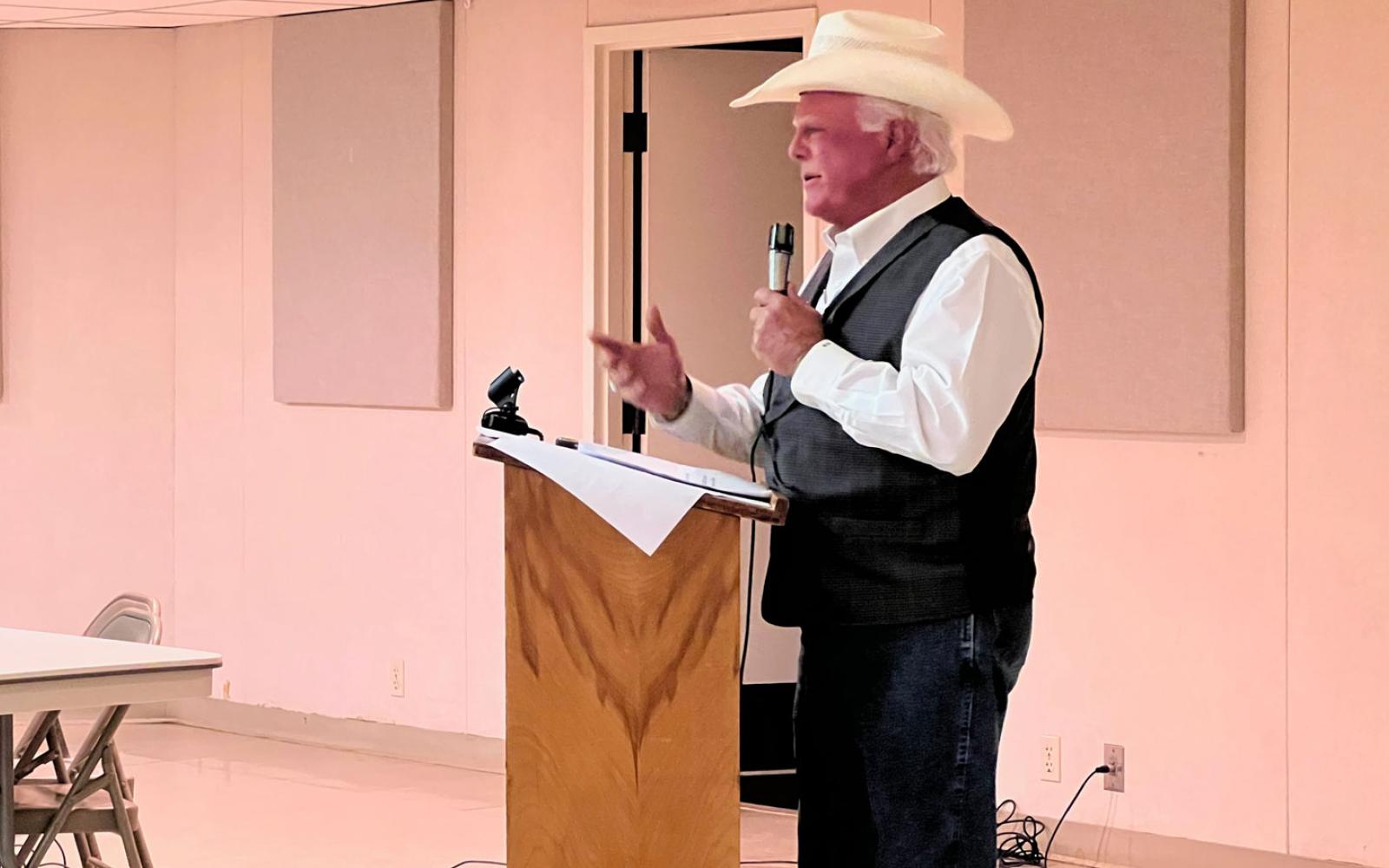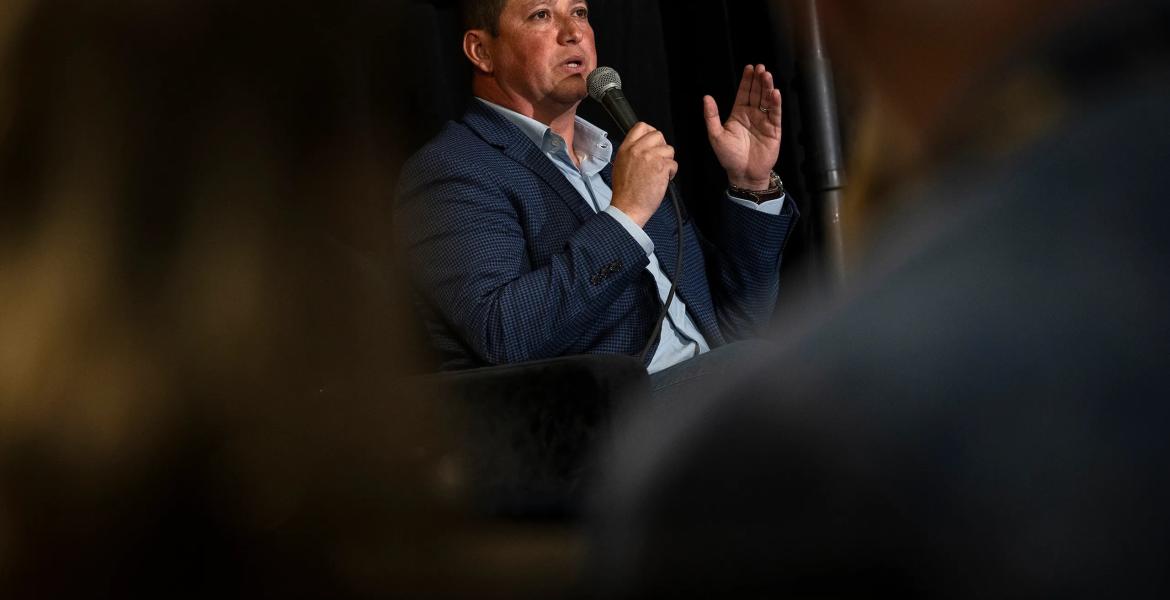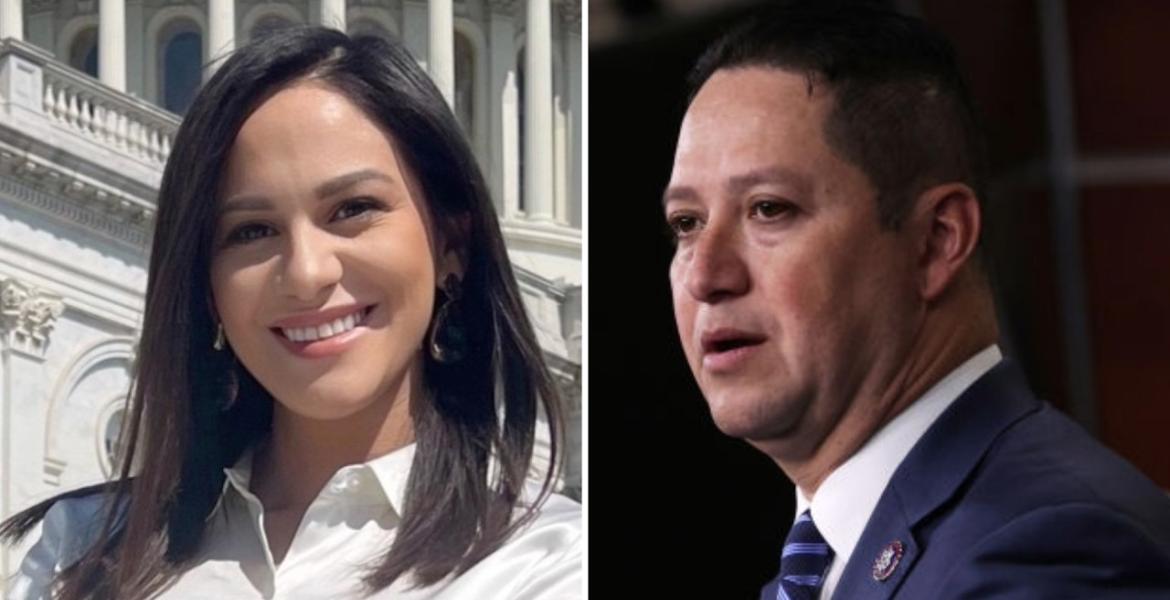WALL, TX — Texas Agriculture Commissioner Sid Miller spoke at the annual Texas Farm Bureau barbecue at St. Ambrose Catholic Church in Wall Tuesday night. In the far-ranging speech, Miller warned that leftwing progressives running the country are well on their way to reserving 30 percent of the planet’s surface for conservation by 2030. In doing so, our property rights are being taken away.
The plan is known as 30x30 and is endorsed by the Biden Administration. According to Scientific American, the 30x30 principle is a hallmark of the administration’s Conserving and Restoring America the Beautiful plan. In 2002, Biden had the U.S. formally join the High Ambition Coalition (HAC) for Nature and People, a group of more than 90 countries encouraging the adoption of the 30x30 target.
According to Miller, 30x30 is being successfully implemented and the majority of the land set aside in 30x30 is farm and ranch land.
“In 2020, only 12 percent of farmland was taken out of our inventory nationwide. In 2023 we are at 20 percent,” Miller said. He warned there is a second agenda to remove 50 percent of our farmland by 2050, or the 50x50 plan.
Miller said the federal government is accomplishing the 30x30 goal by canceling grazing leases on Bureau of Land Management (BLM) land, adding more endangered species to federal protection to ban land use, and giant land grabs by the National Park Service.
Of the latter, Miller warned of legislation that studied putting large swaths of land under NPS oversight called the Chisholm and Great Western National Historic Trail. According to Miller, the Chisholm plan will cover 56 Texas counties that once were a part of the meandering Chisholm Trail in the late 19th century. The large swath of land continues north through Enid, Oklahoma and to Wichita, Kansas.
The Oklahoma Farm Bureau warned that the NPS plan will remove property rights from farmers and ranchers in the way. The sledgehammer, according to the Oklahoma farmers, will be environmental policy within the confines of the gigantic land designation.
The plan requires “an environmental assessment [to] identify an environmentally preferable alternative” that “will promote the national environmental policy as expressed in the National Environmental Policy Act’s section 101” (52). The Plan states, “Ordinarily, this means the alternative that cause the least damage to the biological and physical environment; it also means the alternative which best protects, preserves, and enhances historic, cultural, and natural resources,” the Oklahoma Farm Bureau noted, quoting from the NPS study on the Chisholm Trail designation.
Miller stressed that the agenda to reduce farmland is real and part of a global initiative.
“In the Netherlands, the government is nationalizing farmlands. They have outlawed nitrogen fertilizer and mandating a 50 percent reduction in livestock,” Miller said. “In Ireland, there too, they are working towards a 50 percent livestock reduction.”
Where will protein come from if there’s not much beef left in Europe? Miller said scientists are busy creating processes that produce protein out of crickets and worms.
More likely, however, is what National Review columnist Michael Brendan Dougherty wrote on June 8 about Ireland culling 200,000 cows to meet climate targets.
"The lost beef production will almost certainly move to Brazil, a place where the expansion of ranches often means the cutting down of the Amazonian rainforests,” Dougherty wrote.
To combat the 30x30 and 50x50 plans and to preserve farm and ranch lands in Texas, Miller said the U.S. House must address agriculture property rights in the next Farm Bill (the last Farm Bill was authored and passed under the direction of Congressman Mike Conaways’ House Ag Committee in 2018). Also, Miller praised State Rep. Drew Darby’s collaboration on the “Right to Farm Act” during the 2023 legislative session.
The “Right to Farm Act” is a Texas constitutional referendum that is on the ballot in November. According to Miller, "The proposed constitutional amendment specifies that Texans have the right to farming, ranching, lumber and timber production and horticultural business. They also will have the right to operate wildlife management programs on land that is owned or leased.”
The constitutional amendment is in trouble, Miller warned. Harris County, an urban county with voters less concerned about farming and ranching than voters in the Concho Valley, is holding a contested Houston mayoral election in November. Urban votes could outnumber rural voters and urban constituents could vote against farming and ranching. The central issue for urban citizens is municipal growth onto farmland — urban sprawls. Farmers and ranchers call that encroachment.
Ever the salesman for all things ag in Texas, Miller noted that, “Each year Texas generates about $24.7 billion in cash receipts from agriculture and employs 1 out of every 7 working Texans. This industry has earned its place in our Constitution.”
He urged everyone to vote for the “Right to Farm” Texas constitutional amendment in November 2023.
Miller was equally concerned about current energy policy in Texas. He said in February 2021 when Winter Storm Uri devastated Texas, about 20 percent of ERCOT’s power production came from wind energy. Today, that number has doubled to 40 percent, Miller said. Wind energy was blamed in conservative circles for causing the grid failure in 2021. Our reporting somewhat backs this up, but it wasn’t due to lack of capacity sans wind that shut down major parts of the grid. Rather it was caused by ERCOT technicians not leading the freezing of the wind turbines and accompanying rapid reduction of wind energy power by shedding the load quick enough, causing natural gas plants to disconnect from the grid.
Regardless, Miller sees wind and solar power as less reliable than fuel-powered power plants and stated his alarm about the doubling of wind power when alternative energy sources were suspect during the Uri freeze.
The Texas Farm Bureau is a non-profit organization serving 500,000 member families statewide. According to the Texas Farm Bureau’s mission statement, "We believe private property rights are worth protecting, water should be used wisely and government should be responsive and responsible. That’s why we advocate with our members in Austin and Washington.”
The event was well-attended and held for the Concho valley region of the Texas Farm Bureau that includes Tom Green, Irion, Crockett, Sutton, and Schleicher Counties. Lane Puckitt serves as the Tom Green County Farm Bureau president and Anthony Munoz is the Bureau’s regional field representative. At Tuesday evening’s meeting, 10 board members were re-elected to the 24-person board of directors for the county.
On the Wednesday, August 9 episode of the LIVE! Daily News, we will have an extended interview with Texas Agriculture Commissioner Sid Miller. We will discuss the apparent drought of 2023 and its impact on crops statewide, wind and solar projects replacing farm and ranch land, foreign ownership of Texas land particularly near Laughlin Air Force Base near Del Rio and Dyess Air Force Base near Abilene, and whether Commissioner Miller is still backing Donald Trump for president. The LIVE! Daily News Show is live streamed on this website, YouTube, Facebook, Twitter, Rumble and LinkedIn during the 4 p.m. hour. The show is published as a podcast on Apple Podcasts and Spotify shortly thereafter. Direct links to the show are included in the LIVE! Daily Email every weekday evening. You can subscribe here.
During the Q&A following his speech, Miller predicted that there are not enough votes in the Texas Senate to convict Texas Attorney General Ken Paxton. The trial begins Sept. 5.

Texas Ag Commissioner Sid Miller speaks at the annual Texas Farm Bureau barbecue in Wall on August 8, 2023.
Subscribe to the LIVE! Daily
Required






Post a comment to this article here: